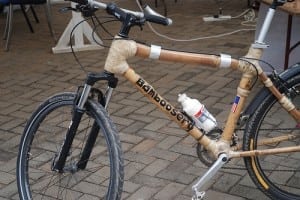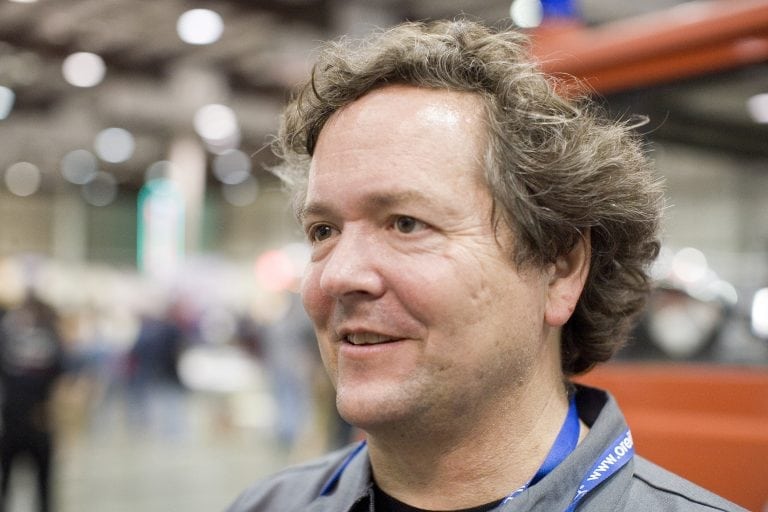Maker Faire Africa captured imaginations when it debuted last year in Accra, Ghana. The world – and Africa itself – saw the inventions coming from African villages, labs, and garages. Among the highlights, we saw furniture made of water bottles and a radio station built by an enthusiast who then broadcast his own show. Now, the event is back, running August 27-28 in Nairobi, Kenya.
We spoke with Emeka Okafor, one of MFA’s founders, just before he flew to Nairobi from his home in New York City. He speaks as eloquently as ever about the event’s meaning and potential – both inside Africa and out. Also, he let slip one detail: This year’s makers may have open-source wifi and other technical projects on the tables.
These are excerpts from our interview:

One of the key challenges the continent faces is its ability to solve problems. If you look at societies and how they evolve problem-solving capabilities, you’ll realize that the tools are usually generated from within. So, it is important to hold up a mirror to [African] society for them to see those very resources that they may be overlooking. But while you do that, also provide a bridge to those elsewhere who, through collaboration, could enable the process and provide insight.
E4C: How do you see Maker Faire’s potential within Africa?
EO: By no means is Maker Faire Africa a static entity. It will be something that is continuously growing, evolving, propagating and replicating itself – in some cases even in ways that we may not envisage or recognize.
That’s it in broad strokes. On a more granular basis, fabrication hasn’t developed to the extent that it should, particularly in Sub-Saharan Africa. If you look at the fast-growing economies in Asia, India, South America, one of the major engines of their growth has been the emergence of manufacturing, the emergence of a culture of production that takes everything from iron ore to raw cocoa beans and adds value to it. It allows a society to build wealth they need to pull themselves up by their bootstraps.
 E4C: Do you think that Maker Faire Africa will plant some seeds for that kind of growth?
E4C: Do you think that Maker Faire Africa will plant some seeds for that kind of growth?
EO: It would be overly presumptuous to think that a fair held once a year will do this on its own. I see this as a kickstarter that will seed, to use your term, the creative community to look at how they can feed from the resources that are already there.
This is a very incremental approach. It could take five years or it could take 100. But the thing is, look at creative communities, from today’s Silicon Valley, Massachusetts Route 128, Pittsburgh in America 100 years ago, or similar clusters around the world. What makes any of those communities unique is that they had evolved into self-reinforcing ecosystems that would take the resources of intellect, curiosity and inventiveness and form them so that they could take cotton and turn it into cloth and iron ore or coal and turn it into steel or chemicals or what have you.
We do have clusters like that in Africa, but they’re disaggregated, and the individuals who are involved are largely disenfranchised because they don’t realize that what they’re doing is important. So, we want people from those communities to understand that their work is as important as that of someone who might have an advanced degree in engineering. We would like to give them a sense of equivalence in what they’re doing.
We’d like to form a common platform where people feel comfortable, playful, curious and energized, where people don’t think that they can’t say something if they don’t have a certain pedigree.
E4C: Has Maker Faire Africa produced those types of collaborations or inspired people to get together?
EO: A year is too early to talk about results if you’re looking for, ‘Well, have we spun off five companies in a year or not.’ The very first step that we felt was important was validation of this space – validation of the informal, formal, tinkerer and scientist all being one.
When you have people come from across the continent and from outside of it to meet a young man or a woman who may not even have traveled beyond his or her capital city – and we saw this in Accra, last year – it demonstrates to them that what they are doing is important. The value of that is inestimable. You now have people that, hitherto, had not even been written about in their own countries being profiled in The Guardian of England, being written about in the United States. It made people within the countries say, ”Well, how is it that people are flying in to listen and to talk to these individuals and we haven’t even acknowledged them ourselves?’ As this community develops, we intend to build self-generated resources that allow these individuals to self-organize and assist each other and work with each other. One of the greatest strengths of any community is the strength they glean from each other. And it’s not necessarily finance; it’s not that we are going to disperse money. The transfer of experiences is something that is timeless in its value.
 E4C: What kind of projects can we expect to see this year?
E4C: What kind of projects can we expect to see this year?
EO: The projects do have a jury-rigged aspect to them, which some people from the developing world may not understand. [But, to work in Africa,] there’s a certain robustness that need to be built in.
Not to say that we’re not looking at how to bring aspects of industrial design to the attention of these makers, but that’s part of an evolutionary process that many of these societies need to go through while they aim for more polished equipment. So, we see this as, ‘It’s okay if it looks rough. It doesn’t matter if the weld is showing.’ That was something that was lost upon previous generations in Africa, where they thought that they can buy the best and the newest, but not know how to fix or make it.
E4C: Any surprises?
EO: There are going to be quite a few pleasant surprises, not just in the prototypes being built, but in other areas of invention like open-source wireless networks. We’ll have radio engineers who are putting together radio networks working with people who are building high-speed wireless networks. And you’ll have metal workers and people setting up solar systems, and, who knows, possibly wind-generating systems as well. That will give the fair a much more connected feel. We believe that that fosters networks that are key to the success of what we’re doing.
“Venture catalyst” Emeka Okafor is an entrepreneur, curator, one of the founders of Maker Faire Africa, and director of the TED Global 2007 Conference in Arusha, Tanzania. He publishes two news and opinion blogs, Timbuktu Chronicles, and Africa Unchained. He is Nigerian, by way of the United Kingdom, Canada and New York.


 E4C: Do you think that Maker Faire Africa will plant some seeds for that kind of growth?
E4C: Do you think that Maker Faire Africa will plant some seeds for that kind of growth?